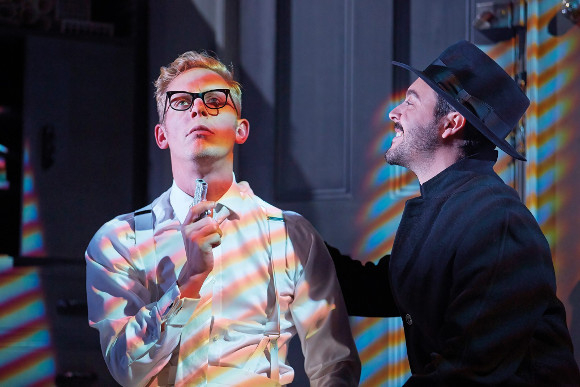Strangers on a Train
Laurence Fox and ”Boardwalk Empire”’s Jack Huston star in this screen-to-stage adaptation at the Gielgud Theatre

Patricia Highsmith’s first novel, an acrid psychodrama with a strong homoerotic undertow, was turned into a brilliant, melodramatic film noir by Alfred Hitchcock. Craig Warner‘s new stage version, directed by Robert Allan Ackerman, tries to have the best of both worlds, falling down badly in the middle.
The stage, and the costumes, are composed entirely in black and white – with various shades of grey – and the show summons the dashing train and the swirling fairground with a strikingly elegant combination of lights and projections around designer Tim Goodchild‘s sleek art deco interiors and jagged outlines.
Reverting to Highsmith’s plot, in which architect Guy Haines (he’s a star tennis player in the film, which is why Bruno gets talking to him) is involved in a criss/cross murder pact with a psychopathic playboy, the second act becomes a study in gathering guilt; but without the bare knuckle ride of Hitchcock’s climactic chase, the incriminating cigarette lighter and the crazy carousel nightmare.
Laurence Fox as Guy does his level best to maintain a tortured decency but struggles to remain interesting over two hours, while Jack Huston’s brashly confident Charles Bruno swaggers superficially from scene to scene with none of the sinister charm or deviousness of Robert Walker in the movie.
The deal’s the same, though: Guy is suckered into shooting Bruno’s father, who is doing him out of his money, he claims, after Bruno has, much to Guy’s surprise and dismay, gone ahead and strangled his wife Miriam (attractive MyAnna Buring) who is pregnant by another man.
Whereas Highsmith tightens the knot by developing a symbiotic psychological trade-off between the two men, and plunging Guy into a tragic emotional maelstrom, Hitchcock and his screenwriter, Raymond Chandler (succeeded by a studio hack), keep Guy clean and wholesome, only vaguely fascinated by Bruno; Warner doesn’t apply enough clarity to the process of disintegration, or the plot twists, to make a satisfactory dramatic blend of these elements.
There’s a surprise conflagration at the end, but this seems more like an admission of defeat than a justifiable dramatic coup. The show’s energy drains the longer it goes on, despite a vivid contribution from Miranda Raison as Guy’s lover, a chirpy support performance from Tam Williams and, especially, a drawling Southern cameo from Imogen Stubbs as Bruno’s platinum blonde mum reconceived as a sketch by Tennessee Williams.
Best of all, though, apart from the two leads, is Christian McKay as the private detective who smells a rat or two while reminding us how marvellous he was as the young Orson Welles on film a few years ago; actually, there’s something bumptiously Wellesian about Huston’s Bruno, but too little of the inner devil.
See Also: Our Brief Encounter with Miranda Raison












